Interviews 1994
...This year saw archives (or attics) being plundered by the researchers of The South Bank Show to reveal home movies just a little weirder than your average blurred footage of a fortnight in Corfu. These would find a wider audience the following year when Redemption would edit and release The Forbidden and Salome on video. Meanwhile, Barker had moved on from shooting on 16mm film in a florists' shop after hours with a few mates to staging grand spectaculars at the Pantages Theatre and resurrections in the middle of the Mojave... to say nothing of CGI - please let's say nothing of the CGI... Candyman 2 was shot and Hellraiser IV : Bloodline followed close behind, Barker paying visits to the latter in the evenings after working all day on Lord of Illusions. Thief of Always was taking shape as an animated feature and Weaveworld was due to go before the cameras late in the year... On the book front, Everville advanced the Art trilogy one stage further...
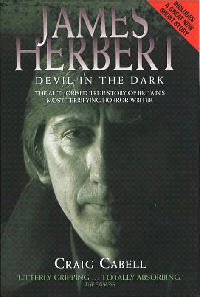
The South Bank Show (A&E Biography)
By Melvyn Bragg, (i) The South Bank Show, London Weekend Television, May 1994 (packaged in the US as A&E Biography) (ii) briefly quoted in James Herbert: Devil In The Dark by Craig Cabell, 2003
"I keep a notebook beside the bed so I keep what roughly might be called a dream journal. So dreams are very important - and so are daydreams. In a sense what am I doing for 10 hours a day when I'm writing a novel but dreaming with my eyes open? That's the whole business of writing this kind of material I think - is that you're plunging down through layers of your consciousness into hopefully fairly primal areas."
Monster Invasion
By Mark Salisbury, Fangoria No 133, June 1994
"My imagination is a bucking bronco and it's going to go wherever the hell it wants to. I don't really have any choice. Imajica was certainly a risky book in terms of its subject matter, and Thief of Always was in some ways a difficult pitch, because it was going off in another direction. But both books found their readers and the readers found them. I'm much more comfortable doing what my heart tells me to do."
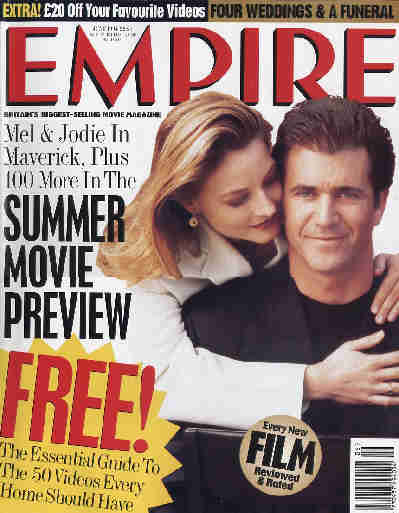
Violence
By [ ], Empire, No 60, June 1994
"I certainly believe there's a kind of movie that you make for 16-year-olds and older; Hellraiser is one of them. Hellraiser is not meant to be viewed by a six-year-old or an eight-year-old or even by a 12-year-old. There is a legitimate concern about getting certain kinds of images into impressionable minds where they cannot be put into context. And the question is, does the responsibility for that lie in the household or does it lie in society in general? I'm not convinced that society can ever take account of behaviour that's internal to a domestic situation. The responsibility has got to lie in the home. It cannot lie with artists. The artist has to have the freedom to go and make the stories or go and make the images that he or she wants to make."
Close-Up
Close-up, Sky Movies, 19 July 1994
"The kind of pictures that I really wanted to see when I was a kid I couldn't. I mean there weren’t videos, there weren't laser
discs, the ‘over 18 or you don't get in’ rule was still held to fairly strong in the cinemas of Liverpool and I suppose I saw my
first X movie – what were then X movies – when I was maybe 15 which would have been Psycho but by and large I couldn't see the stuff.
I didn't see Hammer movies until way after they they'd come out, I saw them in revival houses or later on of course on video, or
occasionally on television but again horror movies didn't tend to make themselves known on British television and still by and
large don't. I mean they're not and if they do they tend to be cut around and bowdlerised so I didn't really get to see a lot
of the Dark Fantasy stuff that I really had an appetite for until a lot later. They weren't formative experiences.
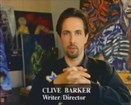 "The formative experiences were literary, I mean it was Poe and Bradbury and the like that I was reading and I wasn't seeing the
movies that were made of Edgar Allan Poe when I was reading his books and I think actually that was probably a pretty good thing
for me. I think for one thing I would over and over again fantasize about the contents of the movies from advertisements that
I would see in newspapers or you know on the Billboards and invariably when I later caught up with the movies, maybe you know
half a decade or a decade later, they were terribly disappointing by comparison with what I'd imagined them to be, far
milder than I'd thought and you know when I was 18, of course, I began to see those movies and I mopped up every horror
movie and fantasy movie that I could find and I still do. The earliest influences therefore were mind movies, they
were things that I was projecting on the inside of my skull and probably therefore making my imagination do the
work which was probably not a bad thing at all.
"The formative experiences were literary, I mean it was Poe and Bradbury and the like that I was reading and I wasn't seeing the
movies that were made of Edgar Allan Poe when I was reading his books and I think actually that was probably a pretty good thing
for me. I think for one thing I would over and over again fantasize about the contents of the movies from advertisements that
I would see in newspapers or you know on the Billboards and invariably when I later caught up with the movies, maybe you know
half a decade or a decade later, they were terribly disappointing by comparison with what I'd imagined them to be, far
milder than I'd thought and you know when I was 18, of course, I began to see those movies and I mopped up every horror
movie and fantasy movie that I could find and I still do. The earliest influences therefore were mind movies, they
were things that I was projecting on the inside of my skull and probably therefore making my imagination do the
work which was probably not a bad thing at all.
"I actually wonder how the new generation of filmmakers coming up, educated as they are or can be so readily from
going to their video store and picking up, you know, the classics or, you know, the movie that was out six months ago and
being able to watch five, six, seven movies a week if they want to – cheaply – how that will influence the movies that they
end up making."
Clive Goes To Horrorwood
By [ ], The Dark Side, No 41, August/September 1994
"It's amazing how many people think I'm an emissary of the devil. They
think I'm doing something that intends to corrupt, well damn right.
Are these people so far from their own childhoods that they've been
able to scrub them clean of every grimy thought? They've somehow built
a little white picket fence around a Norman Rockwell idea of childhood
and they've removed the truth and hid it away somewhere. The truth is
that children are feeing very complex and ambiguous thoughts about the
world, themselves, their sexuality.
"There's a six-year-old Clive Barker alive and well living in the
42-year-old Clive Barker... You throw out Narnia and Never Never Land
for meaningless facts and at the age of 30 or 40 what would you want
more: Never Never Land or the gross national product of Ghana? You
want Never Never Land because it was one of the first places of the
imagination. You need it to deal with the onslaught of banalities.
The tax return, the mortgage, the screwed up relationship, the analyst.
The education system has removed us from the imaginative experience so
far that it's difficult to go back and get it again. "
A Man For All Seasons
By S.C.Ringgenberg, The Comics Journal, Issue 171, September 1994 (Note: interview took place in January 1994)
"I feel as though I'm trying to express my imagination in a whole slew of different ways.
There are definitely pieces of connective tissue between these various activities, even
though the manifestation of these activities may look very different. The underlying
concerns of an Ectokid or Hyperkind are absolutely to be found buried deeply in the novels
- ideas about heroes and about the afterlife, and about responsibility, and about
transformation, and about the force of storytelling and so on. Concerns which are there
for analysers to pick up if they want to, and if, as is more likely the case, not, then
they're there for my entertainment. But I do think of these things as essentially
springing from the same place, which is my desire to tell stories, and to create worlds.
"This may sound strange, but I don't concern myself overmuch with the numbers. It seems
to me if you do that, you end up playing the wrong kind of game. There are great movies
out there, movies that I adore, which did no business whatsoever. There are many very,
very terrible movies out there which have broken all box office records. Would I
prefer to be responsible for the work of Mr Cronenberg or Mr Spielberg? Of course the
answer is Cronenberg. Would I prefer to be responsible for Home Alone or Eraserhead? You
know? Is there any question? You can't concern yourself overmuch with how well it did in
the marketplace. There are a bunch of accountants with abacuses who of course must
concern themselves with that. But one of the reasons I don't buy the Hollywood Reporter
or Variety is because I don't want to be looking every day to figure out how well The
Piano did this week versus Mrs Doubtfire. The fact is, The Piano is a great movie, and
however well it does is academic. It's a great movie. One just shouldn't be driven by
that stuff. You end up getting crazy. You end up being in the wrong race. I mean the race
should be with yourself. The race should be with how good you were last time and how good
you can be next time. The race should never be with your fellow creators to see how much
money you made."
Notes On St Elvis
By Paul M. Sammon, The King Is Dead : Tales Of Elvis Postmortem, Delta, 1994 (note - this interview was rewritten in essay form and amended by Barker)
"We all desire, to some degree, to have something larger and more
mysterious than ourselves. Something more conected with the numinous,
with the holy with the powerful, than with us. And if you don't supply
this urge in quite the right way, people will go and attach those
feelings to the strangest things. They will attach it to channelling,
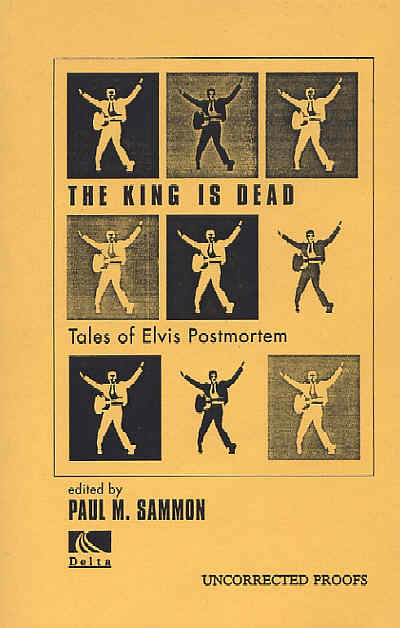 or astrology, or cults of various kinds. They will believe all manner
of weird shit. And this will become, in the fullness of time, religion.
or astrology, or cults of various kinds. They will believe all manner
of weird shit. And this will become, in the fullness of time, religion.
"I have always cherished a scene from the movie of Tommy, when Arthur
Brown plays the High Priest of the Church of Marilyn Monroe. The
director of that film, Ken Russell, was completely onto something there.
Here was the Marilyn cult taken to the extreme of religious experience,
in a peculiarly American sense.
"Yet I'm not certain if Elvis's religious underpinnings are an entirely
American phenomenon. We in Europe have had religion in a fundamental,
as opposed to fundamentalist, form for a very long time. It is very
much a part of the way that our state is run, very much a part of the
texture of our lives. And religious needs have been answered, I think,
at least up until recently, more readily in European than American
society.
"So perhaps the hunger to take innocent secular artists like Elvis
Presley or Jim Morrison and make them objects of religious devotion is
not present in the same degree in Europe because the pantheon of
European saints is already fixed. It is already there and has been for
many hundreds of years."
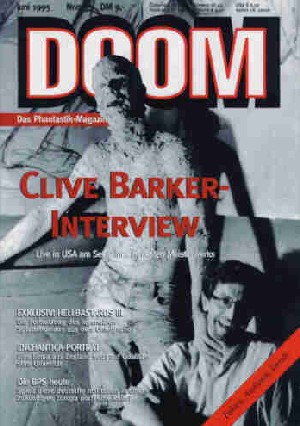
Lord Of Illusions
By J.B.Mauceri-Macabre, (i) World of Fandom, Vol 2, No 22, Fall 1994 (ii) Doom, No 0, June 1995
"Most people expect horror movies to be sort of a lower class experience; that they will not be as rich, as emotional, as well acted or as well designed. Why, why can't they be? What we've done is to say we're going to make a movie that can stand shoulder-to-shoulder with any other genre movie that's out there, be it thriller, romance or drama. Lord Of Illusions will be as well acted and look as good, except it will have a lot of blood-letting in it."
The Horrible Truth About Clive Barker
By Richard Lloyd Parry, The Daily Telegraph, 8 October 1994
"There is a long tradition of fantasy writing in this country. In heroic writing, it's Tolkien. In science fiction, it's H.G. Wells. There's Shelley, Stoker, Stevenson. In children's fiction, there's Carroll and Barrie and C.S. Lewis.
"It goes back through The Faerie Queene, through A Midsummer Night's Dream, Paradise Lost and Blake, back to Piers Ploughman, and so on."
The Conjuring Of Lord Of Illusions Part 1 - Preproduction
By Anthony C. Ferrante,
(i) Fangoria No 138, November 1994
(ii) Fangoria : Masters of the Dark
"I never know what's going to be a problem with the MPAA. I don't
understand these people. They seem to me to be
irrational. I think what they worry about is overall
intensity. They don't want movies to be distressing,
but if you put down your seven bucks to be distressed,
then why shouldn't you have that form of entertainment?
I personally find Macaulay Culkin too intense for a
whole bunch of other reasons. Does that mean I can have
my own little classification board? The MPAA is
essentially protecting people who are not asking to be
protected, and that seems to me to be ludicrous. This
movie ['Lord of Illusions'] will not incite racial
violence, it is not harmful and does not suggest it
would be a good thing to harm women and children. It
will be intense. It is intended to be intense. It's
intended to have people sitting on the edge of their
seats pouring cold sweat."
Clive Barker's Lord Of Illusions
By Marc Shapiro, Shivers, No 13, December 1994
"I wanted to make this a Barkerian interpretation of the world of magic that goes on behind the scenes and that the audience does not see. The story is a dark step back to what I did with the original Hellraiser; an unalloyed narrative that gives the actors a story to enrich and flesh out... I'm having to deal with real, strongly felt emotions and, from the first scene forward, a lot of very intense, emotional things are going on. This is not a movie where we stop everything so people can just sit around and drink martinis. People in this thing are juggling fire. Literally. People are always breaking down, weeping and suffering."
Introducing Harry D'Amour
By Joe Mauceri, Shivers, No 13, December 1994
"We get to know a lot more about Harry in [Everville] and that's fun. I fill in some narrative lines about him and enrich the character. We allude to Harry's previous life. He is described as the man who walks the line between Heaven and Hell. It's very nice for the readers of Everville to have that perspective on Harry when they come to the movie. From the first frame of Lord of Illusions, Harry is a haunted man."
What Frightens Clive Barker?
By Joe Mauceri, Shivers, No 13, December 1994
"With Nightbreed I got caught up in the marketing machine of selling a
movie. At a certain point I got confused as to whether I should be
going for the scares or should I be going with the scare. Things that
start off normal become steadily more bizarre, darker and perverse.
"We had a film distributor's representative over to look at the
material we had shot so far. He said, 'This is a real movie!' I think
that is a very interesting thing. Most people expect horror movies to
be sort of a lower class experience, that it will not be as rich, as
emotional, as well acted or as well designed. Why can't it be? What
we've done is to say we're going to make a movie that can stand
shoulder to shoulder with any other genre movie that's out there, be it
thriller, romance or drama. Lord of Illusions will be that good."





